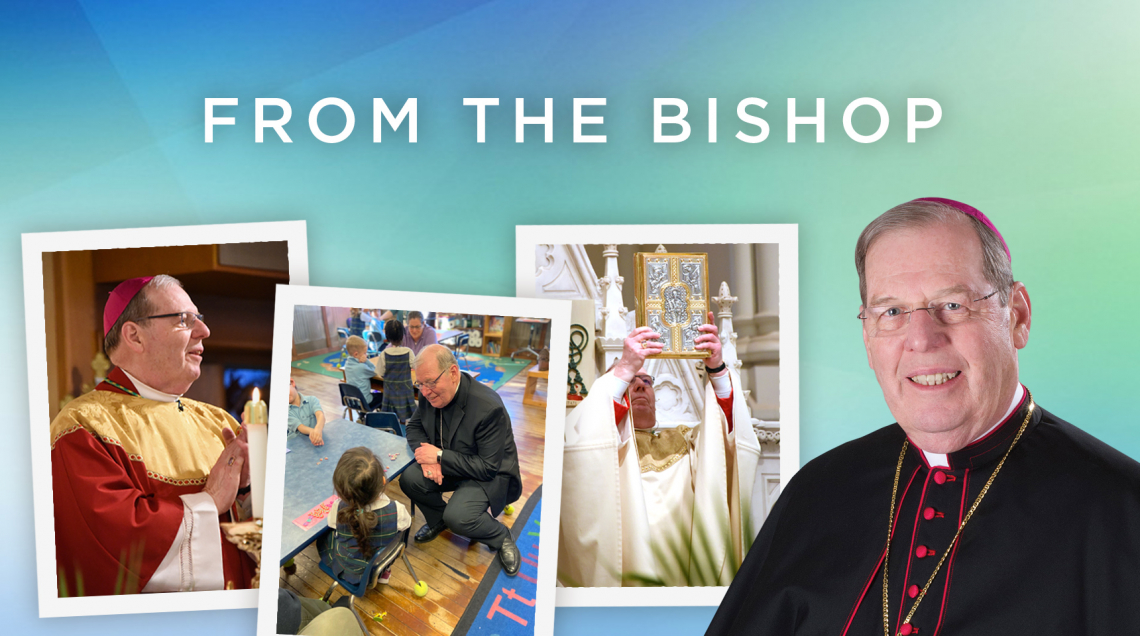From the Bishop - January 2023

Happy New Year! Feliz Año Nuevo! Bonne Année! Buon Anno!
The new year is a wonderful time to count the blessings for which we are grateful. It is also customary at this time of year to make resolutions. That might affect our diet or the amount of exercise we do, but the beginning of the year also gives us an opportunity to examine our attitudes and our ways of looking at our world. It is that kind of resolution I want to influence with this column.
Election season came to an end about two months ago. The debates and editorials seemed unending and the commercials interminable, but in November, we cast our votes, they were carefully counted, and winners were declared. As we begin a new year, we pray for those elected, that the values we treasure of the inherent value of each human person may guide the decisions that they make.
In the aftermath of yet another contentious campaign period, it would be easy and perhaps preferable to move on with our daily lives and put the acrimony and issues behind us. But I believe it is important, particularly in this time of division, to reflect on the election that was, not the results per se, but on how the lessons gleaned from the experience and what we learned about ourselves in the process can better prepare us as Maine Catholics as we move forward in facing future decisions. How did our values, the values of the Catholic Church, interface with how we voted on November 8
We are both Catholics and Mainers, invited to follow and satisfy a dual calling of faith and citizenship. In our November meeting as bishops, we talked about the importance of the teaching document entitled Forming Consciences for Faithful Citizenship. Though the document was written some years ago, it continues to be updated, and it contains an important perennial message regarding the social teaching of the Church. The lessons therein do not apply to a particular election but, rather, explain the political responsibility of all Catholics in exercising their rights and duties as participants in democracy and can help shape our political choices through offering a look at many issues in a Catholic light. These issues include decisions regarding marriage and family, religious freedom, economic justice, unjust discrimination, health care, welcoming the stranger, and ways that we, as Catholic voters, can promote a respect for human life and peace in our time. The material is perhaps even more instructive and impactful when studied outside of the rancor and noise of the election season. As the new year begins, I encourage you to read and reflect on this document, which can be found online at www.faithfulcitizenship.org. We are not currently engaged in political contests. It is a good time to reflect on how we might apply the principles in this document to our future participation in this most fundamental responsibility of voting.
One theme that Catholics can reflect on in elections is our care for creation. This goes beyond our stewardship of the earth and refers to our responsibility to support candidates and causes that promote the protection of born and unborn children and those who are the most poor and vulnerable, helping them build productive futures and lives for themselves and their families. Let us always keep in mind what Pope Francis wrote in his encyclical Laudato Si', a passage that we would be wise to read at the start of this new year and before entering a voting booth in the years ahead:
What kind of world do we want to leave to those who come after us, to children who are now growing up? This question does not have to do with the environment alone and in isolation; the issue cannot be approached piecemeal. When we ask ourselves what kind of world we want to leave behind, we think in the first place of its general direction, its meaning and its values. Unless we struggle with these deeper issues, I do not believe that our concern for ecology will produce significant results. But if those issues are courageously faced, we are led inexorably to ask other pointed questions: What is the purpose of our life in this world? Why are we here? What is the goal of our work and all our efforts? What need does the earth have of us? It is no longer enough, then, simply to state that we should be concerned for future generations. We need to see that what is at stake is our own dignity. Leaving an inhabitable planet to future generations is, first and foremost, up to us. The issue is one which dramatically affects us, for it has to do with the ultimate meaning of our earthly sojourn (n. 160).
Elections are not the only time we might call on these principles. For that reason, I spoke earlier of a New Year’s resolution. Our mission as Catholics is to bring our faith and a consistent moral framework to our community each day. Respect the dignity of each human person and focus on the common good, not our own personal interests. In essence, how can we make the world a better place? Help build the peace we all seek through prayer and action and with generosity and joy.
May you and your families have a blessed and peaceful new year.










